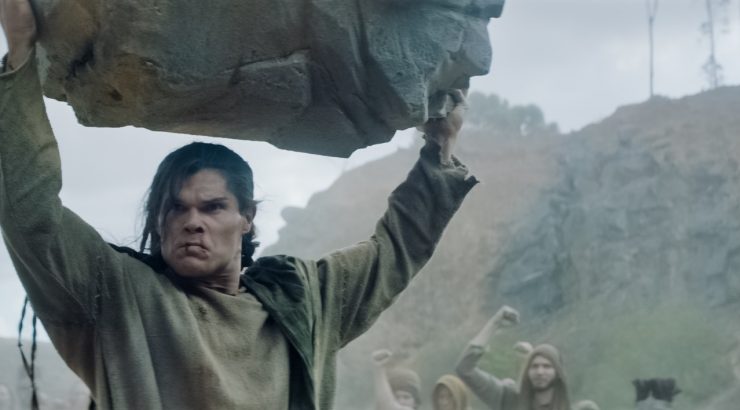
Alumni Spotlight: Jason Baumgardner (’13) Writer of the Biblical Epic, Samson (Pure Flix)
March 5, 2018
Every so often, we’ll be spotlighting alumni and what they are up to these days. These Q&A sessions will give you a bit of insight into where the world has taken them since graduation.
This week, the spotlight is on Jason Baumgardner (MFA/ER ’13) who co-wrote Samson, a biblical epic about a champion chosen by God to deliver Israel. Samson is now playing in theaters in the US and Canada.
What was the process like to land your first industry job?
In regards to the film Samson specifically, I started writing it with my friend Zach Smith. We worked on it on and off for four years before our producer friend, Ian, got it into the hands of Pure Flix. They called us soon after and wanted to option it. After our first rewrite for them, we went from a dark-horse script, farther down their development pipeline to a green-lit film, moving into production. That was a fun call to receive.
Share your career path with us, how did you get to where you are now?
I honestly feel like I’m only one step beyond stepping off the graduation stage, but what I did realize quickly is to keep several irons in the creative fire. As a writer, director, and editor, I’ve been able to get jobs as all three and that’s only by continuing to do all three on my own time. Right out of school, I put all my eggs in one basket and when that project fell through, I realized I spent way too much emotional and creative energy on one project that was not a 100% sure thing. Since then, I know nothing is a 100% sure thing, so I spread out my “creative investments” so-to-speak, hoping one or more will hit at some point. I write scripts, take edit jobs, and even create my own projects like my documentary, Perfect Lineup, about the rise of Daily Fantasy Sports. Great thing about this industry is you can literally create your own opportunities by writing a new script or grabbing a camera and start shooting something interesting.
What is the best advice you have received?
Some great advice that I received was from my writing adaptation professor, Ron Friedman. He taught me that in order to get your project green-lit you need to give those that approve your project a solid reason to keep their jobs if the project under-performs. Give them a key ingredient that should clearly perform… a marketable idea, a name attached, or a story that has worked in the past whether it be in a book or previous film.

You want to give them the ammunition of “you can’t blame me that it didn’t perform!” and thus they know they can defend their approval of the project (and keep their job) from the onset. I personally like to think of this now as a project that isn’t “execution dependent” in order to recoup it’s budget. You theoretically can’t blame execution on a studio or development exec. Of course, my artistic and personal drive pushes me to execute at the highest possible level.
But as a screenwriter, you don’t have much control once it leaves your computer, so giving them something they believe is a good investment no matter the execution is a great tactic to get yourself a job (or a script sale).
What is your favorite memory from your time at Chapman and how did it impact you?
I had several, but one that stands out looking back is screening my 3-2-1 film, “Land or Sky” and the feedback others gave me after that. I went through multiple ideas and scripts in Dave Kosts‘ class and he really did a great job of pushing us to find an idea that resonated personally. I remember finally deciding on that script but not everyone saw how it was going to work. So, pulling the trigger on it pretty late in the process, casting last minute, finding locations, storyboarding, rehearsing and getting it all done despite many production hurdles (we shot on 16mm near Riverside next to a gun range!) and it coming out as it did was satisfying. Then when the encouraging feedback came after the screening, it was one of those seminal moments that I thought to myself, “I can do this film thing I think.” It gave me a lot of confidence moving forward in school and beyond. So, don’t skirt through those class projects! They can instill a lot of long term benefits and not just a grade!
What class did you find most useful for your career path?
Hands down the one that sharpened me the most is Paul Seydor’s editing class. Learning how stories work on screen and how to fix them when they don’t was invaluable. Hard to imagine going to Chapman and not attending his class. Other top classes and professors I haven’t mentioned yet were Bettina Gilois feature screenwriting, Paul Wolansky’s shorts screenwriting, Michael Kowalski’s Post-Production class, Harvey Myman and Glenn Williamson’s Entering the Profession class, and Gil Bettman’s overall belief in me as a filmmaker.
Any parting thoughts?
The friends and collaborators you meet at Chapman are the ones you will get jobs from and give jobs to when you graduate. So, even though you may think the assignments don’t matter ‘in the real world’ they do in regards to your work ethic and like-ability with those around you. Professionalism starts on every set, every classroom, and every collaboration. Working hard and being likeable are the best steps you can take while at school that does translate to long-term success. Learn how to not get emotional about project results, creative decisions, and collaborative disagreements. Focus on building great relationships, not perfect projects, and it will serve you much better in the long run.
Thank you for sharing, Jason!

